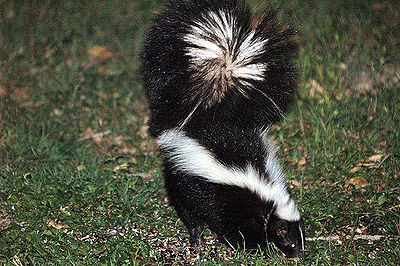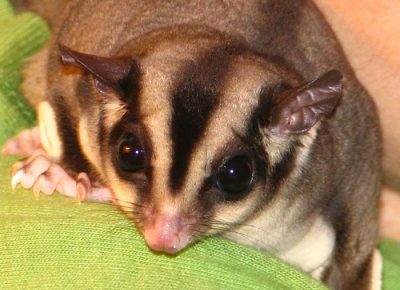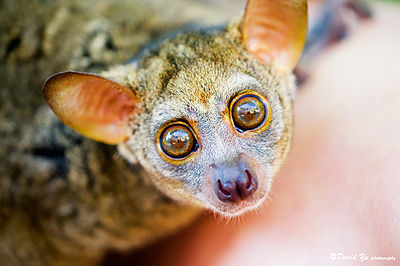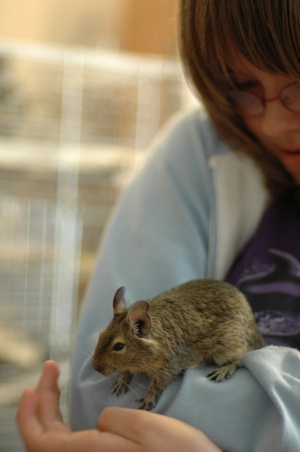
Where do Skunks come from?
Striped Skunks are native to the Americas. The Skunk is a mammal and belongs to the family Mephitidae and the order Carnivora. Captive-bred skunks weigh from 7-10 lbs. They are about the size of a pet cat. Life Span is approximately 10 years. They come in a variety of colors. Once descented, they have an odor similar to that of a dog.
What is the temperament of a Skunk?
Skunks have the personality of a 2 year old child. They are good problem solvers, so be sure your cabinets and fridge have locks on them. They can be destructive, so take care with fine furniture and carpeting. As with all pets, some Skunks like to cuddle while others will settle for a pat. Captive-bred skunks do not carry rabies, but since there is no rabies vaccine for skunks, it’s best to keep them indoors where they won’t be exposed to the disease. It’s best to neuter your skunk at 4-6 months of age as it is healthier for your pet and can reduce behavior problems. If you have other pets, never leave them unsupervised with your skunk. They should have the same run of the house as your pet dog or cat. Activity usually occurs at dawn and dusk, but they will adjust to your schedule.
What should I feed my Skunk?
While a skunk’s diet is still being researched, there are commercial foods available. Guidelines from skunk organizations recommend grain-free dog food,vegetables, poultry and vitamin supplements.
It should be noted that some skunks may be difficult to litter box train. It helps to place litter boxes in all areas where your skunk roams. Check locally about ownership of a skunk as it is illegal in some states and cities. Also, check with your veterinary service if they treat skunks as not all vets do. And check the cost of veterinary care. Always keep proof handy that your skunk was captive-bred.
Other Health Tips
Some other tips are:
- Never declaw your skunk. Skunks can’t eat without their claws and their claws are more like dogs’ claws than cats’ claws; they’re beter for digging, rather than ripping. An occasional clipping is all you’ll need.
- Spaying should be done at about 4-6 months of age, and neutering at 3-4 months of age.
- A yearly checkup should be done as with many pets.
- Only worm your skunk if worms are present in its feces or another pet in your house has worms. Not all skunks have worms. Canteloupe, fig juice of cloves are a safe alternative to dewormers to keep your skunk worm-free.
- Distemper and Rabies vaccines are recommended. The vaccine should always be killed rabies, never live or modified.
- In Ontario, you can’t keep any skunk whatsoever and in other provinces of Canada, you’ll have to have a microchip implant inserted into the skunk. Black-and-white skunks are illegal in Canada without a special permit.
In the United States and elsewhere, check with local authorities about the legality of ownership of a skunk.
Video
Related articles:



